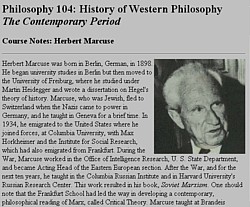| Courses
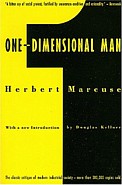 reading
One Dimensional Man (back
to top) reading
One Dimensional Man (back
to top)
- Athabasca University (Open University, Alberta, Canada),
"Contemporary Sociological Theory" (Sociology 337),
read: One-Dimensional Man, with two essays:
MacIntyre, Alasdair. 1970. "One Dimensional Man: The Critique of
Contemporary Society." In Herbert Marcuse by Alasdair MacIntyre.
New York: Viking Press. Rose, Brad. 1990. "The Triumph of Social
Control: A Look at Herbert Marcuse's One Dimensional Man 25 Years Later."
Berkeley Journal of Sociology 35: 55-68. <link,
Apr. 2004>
- California State, Northridge, "Seminar in
Textual Studies" (Communication Studies 604, Spring 1998),
by Ben Attias, read: Herbert Marcuse, One Dimensional Man.
<link,
Apr. 2004>
- Catholic University of America (Washington, DC),
"Modern European Intellectual History, Part II" (graduate
seminar Hist 642), by Prof. Jerry Z. Muller, Spring
2001. <link,
June 2005>
- Apr.23 Radicalism
Reformulated
Marcuse, One Dimensional Man, Intro.,
pp.1-120, 218-259.
Foucault, Discipline and Punish: The Birth of the Prison
(1975)
Recommended: Primary Works
Marcuse, Eros and Civilization (1955)
Secondary Works:
Alisdair Macintyre, Herbert Marcuse: An Exposition and a Polemic
(1970)
Leszek Kolakowski, Main Currents of Marxism, Vol. 3 (Oxford,
1978);
H. Stuart Hughes, The Sea Change: The Migration of Social Thought,
1930-1965 (New York, 1975), ch.4;
Rolf Wiggershaus, The Frankfurt School: Its History, Theories,
and Political Significance (MIT, 1994)
- Colorado College, "European Intellectual History,"
by Susan A. Ashley (faculty
page)
- syllabus:
"Wed., May
4: Marcuse I: One-Dimensional Man, Discuss pts. 1-7
Thurs., May 5 & Fri., May 6: Marcuse II: Discuss pts. 8-10"
- Dartmouth College, "Alternative Political Theory," by Claudia Leeb, 2007 or 2008 (pdf syllabus; Leeb's CV)
- Indiana Univ-Purdue/Fort Wayne, "Ethics"
(Philosophy 111, Spring 2003), by Jeff Governale, read: Herbert Marcuse One Dimensional Man Beacon Press,1992. <pdf
link, Apr. 2004>
- Iowa State University, "Contemporary Sociological Theory" (2003) by Carl W. Roberts.
Read ODM pp. 1-18, 106-114, 226-236, 250-257 (as pdf).
- National University, "Self Under Siege: Philosophy
in the 20th Century," by Rick Roderick
- National University is headquartered in La Jolla, California
- course available from the teaching company (course
page)(8 lectures, 45 minutes/lecture)
Course No. 420, $40, $16 sale price)
- "Lecture
4 studies Herbert Marcuse, the most popular philosopher of the 1960s,
and examines the two contradictions Marcuse sees as being at the
heart of modernity.
*It turns out not to be the case that the more we rid ourselves
of myth and superstition the *less afraid we are in the face of
the unknown.
Instrumental rationality leads to irrational outcomes and dangers.
We learn how Marcuse's practice of imminent critique suggests ways
to eliminate these contradictions and allow humans to live a life
with more freedom and solidarity."
- Roderick received his Ph.D. from the University of Texas at Austin
- Rutgers University/New Jersey, "The World
Transformed ? � The 1960s from an International Perspective"
(Spring 2003) by Martin Klimke, Herbert Marcuse, One-Dimensional
Man (excerpt), in: Albrecht, Sixties Papers, 209-217.
<link,
Apr. 2004>
- Sam Houston State University, Texas, "Seminar
in Social Theory," by Alessandro Bonanno, Fall 2004. recommended
reading [syllabus]
- November 3-10 Varieties of New-Marxian Theory ((Modern Sociological
Theory Chapter 4). Marcuse, One Dimensional-Man. Horkheimer, Traditional
and Critical Theory.
- Thiel College, Pennsylvania (?), "Contemporary
Continental Philosophy," by Diane Bowser, April 2000. Has a detailed
notes page with questions for ODM chaps. 1-4. [syllabus
6/05]
- University of Southern California, "Contemporary
Sociological Theory" (ca. 2001), by Mathieu Deflem, read:
Marcuse, Herbert. 1964. "The New Forms of Control; The Triumph
of Positive Thinking; Conclusion." Pp. 1-18, 170-199, 247-257 in
his One-Dimensional Man. Boston: Beacon Press;
Marcuse, Herbert. 1964. Negative Thinking: The Defeated Logic of Protest.
Pp. 123-143 his One-Dimensional Man. Boston: Beacon Press. <link,
Apr. 2004>
- University of Washington School of Law/Seattle, "Critical
Perspectives in Law" (Law A547, Fall 2001), by Louis E. Wolcher,
read: The New Forms of Control, and Conclusion, in Herbert Marcuse,
One-Dimensional Man: Studies in the Ideology
of Advanced Industrial Society (Boston: Beacon Press, 1966), 1-18, 247-57.
<link,
Apr. 2004>
- Universität Mannheim, "Soziologische
Zeitdiagnose" (Spring 2003) by Johannes Berger, read: Marcuse,
Herbert (1991): Der eindimensionale Mensch.
Köln, Kap. 1 u. 6; Marcuse, Herbert (1964): Industrialisierung
im Werke Max Webers. In: ders., Kultur und Gesellschaft
2. Frankfurt a.M., S. 107-130. <link
to archive copy, Apr. 2004>
- University of Notre Dame, Indiana, "Radical
Social Thought" (anthropology, 2003), by Greg Downey, had
as a supplemental reading: Herbert Marcuse One Dimensional
Man. <link,
Apr. 2004>
- Dickenson College/Carlisle, PA, "From Wall
to Wall� Politics and Aesthetics in Germany and China" (German,
Spring 2002), by Wolfgang Müller and David Strand, read: Herbert
Marcuse, One Dimensional Man (Introduction,
Chapters 1 and 10) <link,
Apr. 2004>
- Kepler Universität Linz, "Herbert Marcuse:
Die Ideologie der Industriegesellschaft der sechziger Jahre,"
Seminar aus Sozialphilosophie SS 1998 <title
page, table
of contents, May 2005>
- US Naval Academy, "Political Philosophy,"
by Lt. Derek Reveron, Fall 2002. Marcuse's ODM is the topic of week
8. [syllabus,
June 2005]
|
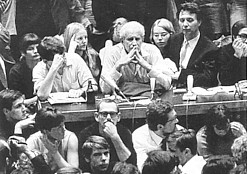
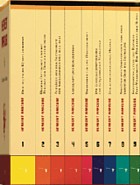
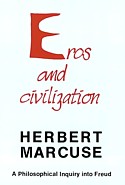 Eros
and Civilization (1955) (
Eros
and Civilization (1955) (
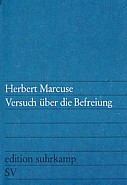
 reading
The Aesthetic Dimension (1978) (
reading
The Aesthetic Dimension (1978) (